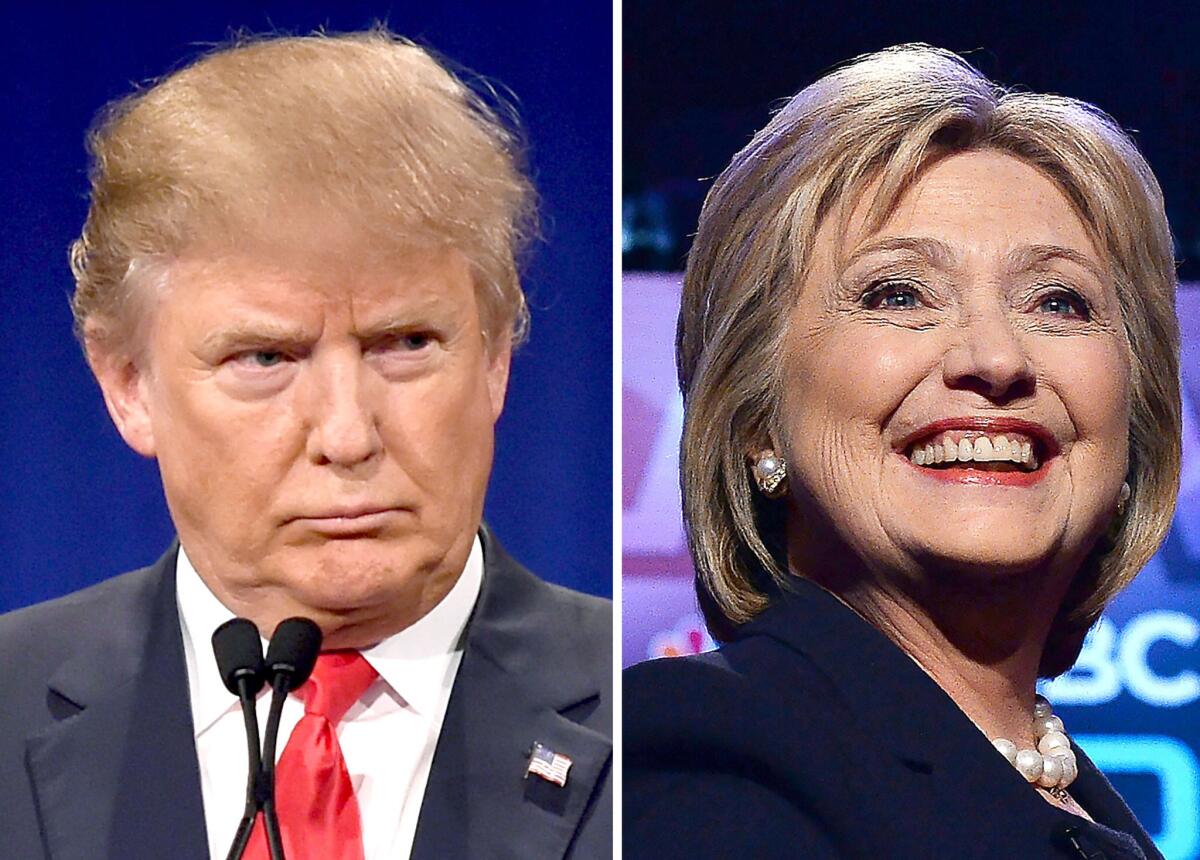Those polls showing Donald Trump catching up with Hillary Clinton: Really?

A raft of polls in recent days has shown a sharply tighter presidential race, with Hillary Clinton's lead over Donald Trump shrinking to just a couple of points. Those polls have generated a lot of questions: Just how reliable is polling this far in advance of an election? What's causing the polls to shift? Can Trump actually win?
Here are some key questions and answers.
I keep seeing new polls that show Trump catching up with Clinton. That's just noise, right?
Nope. Polls conducted in May can't tell you who will win in November, but they do answer a big question about what's going on among voters right now.
What question?
Will Republican voters unify behind Trump? A month ago, when Trump was still battling Sen. Ted Cruz of Texas and Ohio Gov. John Kasich for the nomination, and most GOP leaders were keeping him at a distance, we didn't know whether the GOP could unify. Now we know they can. Most Republican voters — not all, but the large majority — have swung into line behind their presumptive nominee.
What's the evidence for that?
Several polls have shown the percentage of Republicans with a favorable view of Trump shooting upward since he became the party's presumptive nominee. In Gallup's surveys, for example, the share of the GOP with a favorable view of Trump has gone from just over half in April to two-thirds now. The share of Republicans saying they'll vote for Trump has similarly risen.
Election 2016 | Live coverage on Trail Guide | Track the delegate race | Sign up for the newsletter
So what impact has that had on the polls of head-to-head matchups?
A month ago, if you averaged all the recent polls, you'd have found Clinton leading Trump by about 10 percentage points. Now, that lead in the polling average has shrunk to about a point and a half. The shift has come about mostly because Trump is doing much better among voters who identify themselves as Republicans or Republican-leaning independents.
If the end of the Republican primaries boosted Trump, will Clinton get a boost when the Democratic primaries finish?
That could be the single most important question in the campaign.
And?
And we don't know the answer. If Democrats do unite behind Clinton the way Republicans have united behind Trump, we'll probably see her lead expand again. If not, the race could remain extremely tight, and a Trump victory much easier to envision.
So what you're saying is that the current polls give a picture of what a fractured party would mean for Clinton's chances of winning?
Exactly.
Which Democratic voters are most problematic for Clinton?
The former secretary of State does well among voters who identify themselves as Democrats. Her biggest problem is among self-identified independents who normally vote Democratic. That group includes a significant chunk of voters who are further to the left than the average Democrat. They tend to favor Bernie Sanders, and many of them have a very negative view of Clinton.
Can those sorts of negative views change?
Trump just proved that they can.
I thought Trump was extremely unpopular among voters.
Among voters who aren't Republicans, he still is. In the latest NBC/Wall Street Journal poll, for example, Trump's net image rating — the percentage of registered voters who hold a positive image of him minus the percentage who hold a negative image — sits at negative 29. That's several points better than his rating in April, but it's still worse than any major-party nominee.
Clinton's not doing so well either, is she?
No. Her net score in the NBC/WSJ poll is negative 20.
Have previous races gone through similar ups and downs?
Absolutely. In 2008, for example, after Sen. John McCain clinched the GOP nomination, he had a lead in polls over then-Sen. Barack Obama, who was still locked in a primary fight with Clinton. Once Democrats unified, Obama moved into the lead.
Speaking of Obama, what's up with his poll numbers?
Up is the operative word. The president's popularity has risen steadily since the start of the year and now stands at about the level it was when he won reelection. That's good news for the Democrats since the popularity of the incumbent president is a strong factor when voters decide on his successor.
I hear people say that some of the new polls have flaws.
All polls have flaws. No sample is perfect. But focusing on the pluses or minuses of each individual survey can just be a distraction from the overall picture. Better to keep an eye on the averages.
The same polls say Sanders would do better than Clinton against Trump. Is that real?
We can't know for sure, of course, but there's reason to doubt it.
Like what?
Sanders has gone through the entire campaign without a single negative ad aired against him: The Clinton campaign didn't want to rile up his voters, and Republicans wanted to build him up as a rival to her. His positions, including higher taxes for most Americans and big increases in government spending, as well as his past statements, such as praise for Fidel Castro, would provide lots of fodder for Republican attacks if he were to somehow become the nominee. History suggests those attacks would cause his standing to drop.
The polls you've been talking about are all national, but presidential elections get fought out state by state, right?
Yup. A candidate can win the popular vote nationally and still lose, as Vice President Al Gore proved in 2000. Victory requires winning enough states to gain 270 electoral votes.
How do the key states look?
There are fewer state polls than national ones, but so far, Clinton leads in battleground states including Florida, Ohio and Virginia where recent polls have been taken. An analysis of the NBC/Wall Street Journal poll suggested that Trump was running somewhat ahead of Mitt Romney's 2012 pace in rural areas but that Clinton was matching Obama's performance in urban ones.
For more on Politics and Policy, follow me @DavidLauter
ALSO:
Bernie Sanders is a socialist? Some on the far left say 'sellout' is more like it
Get the L.A. Times Politics newsletter
Deeply reported insights into legislation, politics and policy from Sacramento, Washington and beyond. In your inbox three times per week.
You may occasionally receive promotional content from the Los Angeles Times.








